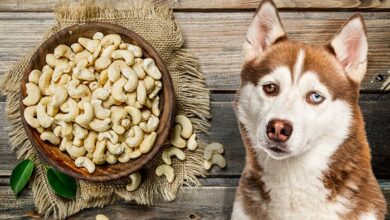Is Falafel Safe for Dogs? Exploring Potential Risks

Is Falafel Safe for Dogs? Let’s begin with an introduction to falafel. This popular dish hails from the Middle East and is cherished for its unique flavor. It’s made mainly from chickpeas or fava beans, and is often mixed with onions, garlic, and spices.

Falafel is typically cooked by frying or baking, giving it a crispy texture. While it’s a favorite among people, it’s important to consider whether these ingredients and preparation methods are safe for dogs. Let’s dive into what makes falafel special and what you should know before sharing it with your furry friend.And also let’s find out that- is falafel safe for dogs?
Is Falafel Safe for Dogs? Common Ingredients in Falafel and Their Effects on Dogs
When considering is falafel safe for dogs or not, it’s crucial to understand the ingredients commonly used in its preparation. Here’s a look at the main components and their potential effects on your canine companion.
Chickpeas and Fava Beans: Benefits and Potential Issues
Chickpeas:
Benefits:
- Protein and Fiber: Chickpeas are a good source of protein and fiber, which can aid in muscle maintenance and digestive health.
- Vitamins and Minerals: They also provide essential vitamins and minerals like iron, magnesium, and B vitamins.
- Potential Issues:Digestive Upset: In some dogs, chickpeas can cause gas and bloating if consumed in large quantities or if the dog isn’t used to them.
- Preparation Concerns: Ensure chickpeas are plain and cooked without any added spices or seasonings.
Fava Beans:
Benefits:
- Nutritional Content: Similar to chickpeas, fava beans are rich in protein, fiber, and various vitamins and minerals.
- Potential Issues:Digestive Problems: Fava beans may also cause gas and bloating. They should be served plain and cooked.
- G6PD Deficiency: In humans, fava beans can trigger issues for those with G6PD deficiency. While rare in dogs, it’s a consideration for pet owners aware of such conditions in their pets.
Onions and Garlic: Toxic Effects and Symptoms in Dogs
Onions:
- Toxicity: Onions contain compounds that can cause oxidative damage to red blood cells in dogs, leading to hemolytic anemia.
- Symptoms: Vomiting, diarrhea, lethargy, pale gums, and rapid breathing. Severe cases can lead to collapse.
- Emergency Actions: If your dog consumes onions, seek veterinary assistance immediately.
Garlic:
- Toxicity: Garlic, like onions, contains thiosulfates, which are harmful to dogs and can also lead to hemolytic anemia.
- Symptoms: Similar to onion toxicity, including gastrointestinal upset and weakness.
- Emergency Actions: Contact a veterinarian if garlic ingestion occurs.
Spices and Herbs: Possible Digestive Irritants
Common Spices in Falafel:
- Cumin and Coriander: While small amounts might not be harmful, larger quantities can cause digestive upset.
- Chili and Pepper: These can be irritating to a dog’s digestive system and cause symptoms like vomiting and diarrhea
Herbs:
- Parsley and Cilantro: Generally safe in small amounts and can provide some vitamins and antioxidants.
- Mint and Basil: These are usually safe and can even help freshen breath, but should still be given in moderation.
Potential Digestive Irritants:
- Symptoms: Vomiting, diarrhea, gas, and abdominal discomfort.
- Safe Alternatives: Stick to herbs known to be safe for dogs and avoid strong spices.
Is Falafel Safe for Dogs? Understanding the common ingredients in falafel and their effects on dogs highlights the importance of careful consideration. Chickpeas and fava beans can offer benefits but must be served appropriately to avoid digestive issues. Onions and garlic are toxic and should be strictly avoided. Spices and herbs can cause digestive irritation and should be limited. Always prioritize your dog’s health by choosing safe and nutritious alternatives.
Risks of Onions and Garlic for Dogs
When it comes to feeding dogs falafel or is falafel safe for dogs or not, one of the most significant concerns is the presence of onions and garlic. These ingredients are common in traditional falafel recipes but can pose serious health risks to your furry friend.
Toxicity Levels: Why These Ingredients Are Harmful
Onions:
- Toxic Compounds: Onions contain thiosulfates, which are toxic to dogs and can cause oxidative damage to their red blood cells.
- All Forms Are Dangerous: Both raw and cooked onions, as well as onion powder, are harmful. Even small amounts can be toxic.
Garlic:
- Thiosulfates Content: Like onions, garlic contains thiosulfates but in higher concentrations, making it even more toxic to dogs.
- Cumulative Effect: Garlic can build up in the system over time, leading to poisoning even if consumed in small amounts repeatedly.
Symptoms of Poisoning: Vomiting, Diarrhea, Lethargy
Common Signs to Watch For:
- Gastrointestinal Symptoms: Vomiting and diarrhea are often the first signs of onion or garlic poisoning.
- Lethargy and Weakness: Affected dogs may appear unusually tired or weak.
- Pale Gums: The oxidative damage to red blood cells can cause anemia, leading to pale gums.
- Rapid Breathing: Anemia can also result in faster or labored breathing.
- Collapse: In severe cases, dogs may collapse due to the lack of oxygen in their blood.
Emergency Actions: What to Do If Ingestion Occurs
Immediate Steps:
- Contact a Veterinarian: If you suspect your dog has consumed onions or garlic, call your vet immediately for advice.
- Do Not Induce Vomiting: Unless instructed by a veterinarian, do not try to make your dog vomit. This can sometimes cause more harm.
At the Veterinary Clinic:
- Activated Charcoal: The vet may administer activated charcoal to help absorb any remaining toxins in the stomach.
- IV Fluids: Intravenous fluids may be given to support hydration and kidney function.
- Blood Transfusions: In severe cases of anemia, blood transfusions might be necessary.
Monitoring and Support:
- Follow-Up Care: Keep a close eye on your dog for any lingering symptoms and follow up with your veterinarian as recommended.
- Diet Adjustments: Ensure your dog’s diet is free from any ingredients that might contain onions or garlic in the future.
Is Falafel Safe for Dogs? Given the risks associated with onions and garlic, traditional falafel is not safe for dogs. These ingredients can cause serious health issues, including toxicity and anemia. It’s crucial to be vigilant about what your dog eats and to seek immediate veterinary care if they consume any harmful foods. Opt for dog-friendly treats and safe ingredients to keep your pet healthy and happy.
The Impact of High-Fat Foods on Dogs
Feeding dogs high-fat foods like traditional fried falafel can pose significant health risks. Understanding these risks and is falafel safe for dogs or not,can help pet owners make better dietary choices for their furry companions.
Risks of Frying: Pancreatitis and Obesity
Pancreatitis:
- Definition: Pancreatitis is the inflammation of the pancreas, an organ essential for digestion and blood sugar regulation.
- Cause: High-fat foods can trigger this condition by causing the pancreas to become overactive.
- Symptoms: Dogs with pancreatitis may show signs such as vomiting, diarrhea, abdominal pain, and lethargy.
- Long-term Impact: Repeated episodes can lead to chronic pancreatitis, significantly affecting a dog’s quality of life and overall health.
Obesity:
- Caloric Density: Fried foods are calorie-dense and can contribute to excessive weight gain if consumed regularly.
- Health Consequences: Obesity in dogs can lead to various health issues, including joint problems, heart disease, diabetes, and decreased lifespan.
- Behavioral Impact: Overweight dogs may also experience reduced energy levels and reluctance to engage in physical activities.
Effects on Weight Management and Overall Health
Weight Management:
- Balanced Diet: Maintaining a balanced diet with appropriate fat levels is crucial for managing a dog’s weight.
- Portion Control: Feeding appropriate portion sizes and avoiding high-fat treats helps prevent unwanted weight gain.
Overall Health:
- Digestive Health: High-fat foods can cause digestive upset, leading to symptoms like gas, bloating, and discomfort.
- Nutrient Absorption: Excessive fat can interfere with the absorption of essential nutrients, impacting a dog’s overall nutritional status.
- Energy Levels: Maintaining a healthy weight ensures that dogs remain active and energetic, promoting overall well-being.
Safe Cooking Methods: Alternatives to Frying
Baking:
- Healthier Option: Baking reduces the fat content of foods compared to frying, making it a healthier preparation method.
- Consistency: Baked treats can be made to have a similar texture to fried ones, ensuring dogs enjoy them just as much.
Steaming:
- Preserving Nutrients: Steaming preserves more nutrients in the ingredients, offering better health benefits.
- Digestibility: Steamed foods are easier to digest, reducing the risk of digestive issues.
Grilling:
- Flavorful Option: Grilling can enhance the flavor of dog treats without adding extra fat.
- Low-Fat: Grilling allows excess fat to drip away, resulting in a leaner end product.
Is Falafel Safe for Dogs? Due to the high-fat content from frying, traditional falafel is not recommended for dogs. The risks of pancreatitis and obesity are significant concerns, and high-fat foods can negatively impact a dog’s overall health. Opting for healthier cooking methods like baking, steaming, or grilling can provide safer alternatives for preparing treats. Prioritizing balanced nutrition and weight management will help keep your dog healthy and active.
Digestive Issues from Spices and Oils
When considering whether falafel is safe for dogs, it’s essential to examine the potential digestive issues caused by the spices and oils commonly used in its preparation. While some ingredients in falafel can provide health benefits, others may pose risks to your dog’s digestive system.
Common Spices in Falafel: Potential for Digestive Upset
Common Spices:
- Cumin: While cumin is a staple spice in falafel, it can sometimes cause digestive upset in dogs, leading to symptoms like gas and diarrhea.
- Coriander: Similar to cumin, coriander can be a potential irritant for some dogs, affecting their stomach and intestines.
- Paprika and Chili Powder: These spices can cause more severe reactions, including gastrointestinal irritation and discomfort, due to their spicy nature.
Potential Digestive Issues:
- Vomiting: Spicy foods can irritate a dog’s stomach lining, leading to vomiting.
- Diarrhea: Spices can disrupt the digestive process, resulting in loose stools or diarrhea.
- Abdominal Pain: Dogs may experience cramps and discomfort after consuming spicy foods.
Reactions to Cooking Oils: Gas, Bloating, Discomfort
Common Oils in Falafel Preparation:
- Vegetable Oil: High in fat and often used for frying, vegetable oil can cause digestive problems.
- Olive Oil: Although healthier, olive oil in large quantities can still lead to digestive issues.
Potential Digestive Reactions:
- Gas: High-fat oils can cause excessive gas, leading to discomfort and bloating.
- Bloating: Ingesting large amounts of oil can result in bloating, making your dog feel unwell.
- Discomfort: Digestive discomfort from oils can manifest as whining, restlessness, or a distended abdomen.
Safe Alternatives: Spices and Oils That Are Safe for Dogs
Safe Spices:
- Parsley: A safe herb that can aid in digestion and freshen breath.
- Turmeric: In small amounts, turmeric can provide anti-inflammatory benefits without causing digestive upset.
- Basil: Another safe herb that can add flavor without negative digestive effects.
Safe Oils:
- Coconut Oil: In moderation, coconut oil can be beneficial for dogs, promoting a healthy coat and skin while being easier to digest.
- Flaxseed Oil: Rich in omega-3 fatty acids, flaxseed oil is a safe alternative that supports digestive health and overall well-being.
- Fish Oil: Provides essential fatty acids and can improve coat health, without the digestive issues associated with frying oils.
Is Falafel Safe for Dogs? While traditional falafel contains spices and oils that may cause digestive issues for dogs, there are safer alternatives available. By choosing dog-friendly spices and oils, you can prepare treats that are both tasty and safe for your furry friend. Always monitor your dog for any signs of digestive discomfort and consult with your veterinarian before introducing new foods.
Recommendations for Pet Owners
When considering whether is falafel safe for dogs or not, it’s essential to follow guidelines to ensure their safety and health. Here are key recommendations for pet owners to keep in mind:
Moderation and Portion Control: How Much Is Safe?
Portion Control:
- Small Quantities: If you decide to offer falafel or similar foods, it should be in very small amounts. A few small bites are usually safe, but anything beyond that may cause issues.
- Frequency: Limit the frequency of offering such foods. Even dog-friendly treats should be given as an occasional treat rather than a regular part of your dog’s diet.
How Much Is Safe?
- Size and Weight: The appropriate portion size can depend on your dog’s size and weight. Larger dogs can generally handle more, but it’s still best to err on the side of caution.
- Observe Reactions: Start with a tiny amount and observe your dog’s reaction before offering more.
Monitoring for Adverse Reactions: Signs and Symptoms to Watch For
Signs of Adverse Reactions:
- Gastrointestinal Issues: Look for symptoms such as vomiting, diarrhea, or gas. These could indicate that your dog’s digestive system is reacting poorly.
- Behavioral Changes: Watch for changes in behavior such as lethargy, discomfort, or irritability, which can signal a negative reaction.
- Allergic Reactions: Symptoms like itching, swelling, or difficulty breathing may suggest an allergy. These require immediate attention.
What to Do:
- Immediate Action: If you notice any adverse reactions, remove the food from your dog’s diet immediately and monitor them closely.
- Record Symptoms: Keeping a record of symptoms can help your vet diagnose any issues more efficiently.
Consulting with a Vet: When to Seek Professional Advice
When to Consult a Vet:
- Persistent Symptoms: If your dog shows signs of adverse reactions that do not resolve quickly, consult your vet.
- Severe Reactions: For severe symptoms such as difficulty breathing or severe vomiting, seek emergency veterinary care immediately.
How a Vet Can Help:
- Diagnosis and Treatment: Your vet can provide a proper diagnosis and recommend treatment options based on your dog’s symptoms.
- Dietary Advice: They can offer advice on safe foods and treats, ensuring that you’re meeting your dog’s nutritional needs without risking their health.
Is Falafel Safe for Dogs? While falafel contains ingredients that may not be ideal for dogs, following these recommendations can help ensure your pet’s safety. By practicing moderation, monitoring for adverse reactions, and consulting with your vet, you can make informed decisions about what’s best for your dog’s diet and overall health.




